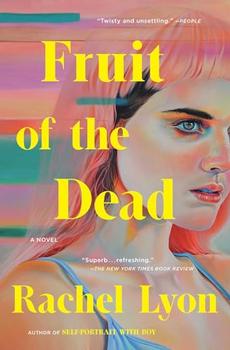Book Club Discussion Questions
In a book club? Subscribe to our Book Club Newsletter and get our best book club books of 2025!
For supplemental discussion material see our Beyond the Book article, Demeter and Persephone and our BookBrowse Review of Fruit of the Dead.
Please be aware that this discussion guide will contain spoilers!
-
Fruit of the Dead reimagines the myth of Persephone, goddess of spring, and Demeter, goddess of the harvest. Discuss the parallels between the novel and the original myth as well as the differences. Did you notice other references to Greek mythology in the novel?
-
The narration alternates between the close third-person perspective, with Cory's narrative, and the first-person voice of her mother, Emer. How does this perspective-swapping affect your understanding of the story? Of the two key characters?
-
There is a beautiful poetic quality to the chapter titles. Discuss how they add to your interpretation of what happens within those sections. Are there hidden meanings to glean?
-
The novel opens with a summer camp performance of The Wizard of Oz. Discuss the author's choice to open the book with this popular cultural reference. How does this set the scene for what's to come?
-
Early on, Cory advises her charge Spenser that "sometimes it's good to do what scares you," which he parrots back to her when his father invites her to dinner. What do you make of this advice? How does this suggestion play out in the novel?
-
How does Cory's impression of Rolo fluctuate in her interactions with him? She often views him with a mix of desire and disgust. What do you make of this combination? Does it seem one instinct is truer in her than the other?
-
When Rolo offers Cory a taste of the drug Granadone for the first time, he says to her, "Your choice, of course. Up to you, always" (page 80). Think about the choices Cory makes and discuss the freedom of decision-making in the novel, or the lack thereof.
-
Though Cory is a legal adult at eighteen years old, we are often reminded of her youthfulness and naiveté. How does the author demonstrate this push and pull between childhood and adulthood? What is your perspective on Cory's level of maturity?
-
Motherhood is an essential theme in Fruit of the Dead. At one point, Emer notes that her "fear has always been a precondition of [Cory's] life" (page 161). What kind of mother is Emer? Did you find her actions relatable?
-
As Cory takes increasing amounts of Granadone, she begins to lose sense of time, leaving her "suspended in a kind of eternal present" (page 198). How does the author communicate this sense of timelessness and disorientation?
-
Cricket, Rolo's beautiful ex-wife, enters the scene in the second half of the novel. How does her presence affect the relationship between Cory and Rolo? What truths does she help bring to the surface?
-
Both Emer's and Rolo's professional lives are under fire due to issues with their companies' products—"one severely blighted, the other dangerously profuse" (page 291). Compare and contrast the way that these characters handle their respective work crises. How does this parallel contribute to your understanding of these characters?
-
Consider the following statements as you discuss the final passage of the book: "The end is for parables and fairy tales. The end is no realer than a lullaby" (page 300).
Enhance Your Book Club
-
The author references several well-known tales besides the myth of Persephone. Consider watching or reading these works and talk about how they relate to Fruit of the Dead.
-
While on Rolo's island, Cory has no access to the outside world. Unplug for a weekend and ruminate on the experience. Is it unsettling? Is it freeing?
-
Read Rachel Lyon's first novel, Self-Portrait with Boy, and discuss any overlapping themes—freedom and betrayal, motherhood and loss, ambition and integrity—it shares with Fruit of the Dead.
Unless otherwise stated, this discussion guide is reprinted with the permission of Scribner.
Any page references refer to a USA edition of the book, usually the trade paperback version, and may vary in other editions.
